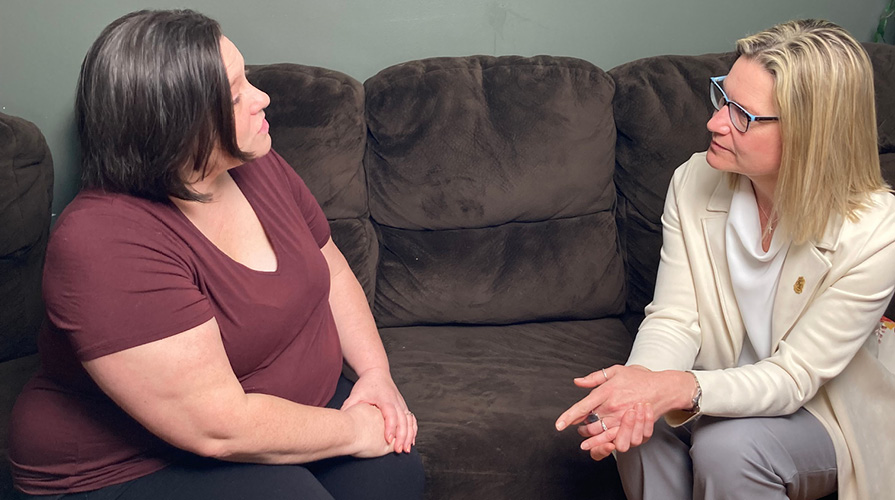Dr. Zacharias discusses opioid crisis in Thunder Bay
On her first full day as president of the Ontario Medical Association, Dr. Rose Zacharias spent time discussing the realities of mental health and addiction, and what more needs to be done.
Dr. Zacharias met with Brenda Letourneau, a recovering addict who now opens her home in Thunder Bay to people in need of a safe place to detox; chatting on the same couch that’s used as a makeshift detox bed when other resources aren’t available. More than 20 people have detoxed in Letourneau’s home in the past year.
“It’s so important when somebody is ready, when they are at the stage where they want help, that somebody is there to support them. It’s not something we can do alone,” Letourneau said. “It’s important to have somebody that can be there and that’s essentially what I do when I open my home.”
Roughly 3,000 people are turned away every year from Thunder Bay’s only withdrawal management program. That’s about eight people a day.
“You’re selfless in your giving and the change that you’re making,” Dr. Zacharias said after hearing Letourneau’s story. “I think every single one of us in health care can be inspired by what you’re doing.”
Dr. Zacharias will be spending the year highlighting the OMA’s Prescription for Ontario: Doctors' 5-Point Plan for Better Health Care, one of whose pillars is mental health.
“We’ve shared something called the Prescription for Ontario and listed our recommendations to the government to increase mental health and addiction supports,” Dr. Zacharias said. “There’s lack of co-ordination, lack of funding, and a lack of the infrastructure that would care for people better.”
The current system is plagued by inadequate mental health and addiction programs, among other problems. Nowhere are the issues more critical than in northern Ontario, where the opioid crisis is growing and resources are limited.
That’s something Letourneau knows from her own experience getting clean.
“There wasn’t a straight line of services. There were so many disjointed services, and it was very confusing to navigate alone. It took me 10 days to get into detox of calling every day to try and get in,” she said. “And there were days that I had given up within that time. So, I understand the importance of it being there and ready when people are ready to go in. Because we can easily lose people.”

Letourneau went through that experience in 2008. She says the situation has since gotten even more dire. That’s why she’s now focused on helping others, on top of managing a full-time job and raising four children.
“There was a woman who I cared for who didn’t have custody of her children. She was at the bottom of the bottom with nowhere to live. She stayed with us until she could get into a treatment centre,” Letourneau said. “We supported her through that journey. Now she has custody of her children and is working and makes me so incredibly proud.”
Photo: OMA President Dr. Rose Zacharias (right) sits with recovering addict Brenda Letourneau who opens her Thunder Bay home to people in need of a safe place to detox.
Opioid-related deaths in Ontario in 2020 rose according to the Canadian Institutes of Health Research. In 2020 alone, 99 people died of drug-related overdoses in Thunder Bay.
“Despite the fact that we are in the worst opioid crisis Ontario has ever seen, what we’re seeing is a reduction in funding, not an increase. Over the last decade, funding has decreased,” said Dr. Chris Cavacuiti, the OMA’s section chair in addiction medicine.
Psychiatrists, emergency and primary care doctors, and addiction medicine specialists continue to provide excellent care for patients. But they do not have enough hours in the day to accommodate the tsunami of new patients asking for help with mental health and addiction.
“To put addiction care in Ontario into context, the OMA represents Ontario’s 43,000-plus doctors, but there are just about 200 physicians across Ontario who identify addictions medicine as their primary section,” Dr. Cavacuiti said. “Lack of funding is the single biggest reason. Also, we have traditionally lacked support from policymakers. A lot of the care is provided by all sorts of doctors who could be doing other things.”
The OMA’s recommendations include introducing provincewide standards for high-quality, equitable, connected and timely mental health and addiction services in the community and virtually. There must be greater accessibility to affordable and publicly funded services so everyone can get the treatment they need.
“It’s my intention with my term as president of the Ontario Medical Association to bring forward our Prescription and talk about the need for increased mental health and addiction supports,” Dr. Zacharias said. “These are very valuable people who struggle with mental health and addiction.”
Letourneau said while the services she received to get clean saved her life, they simply weren’t enough or well co-ordinated.
“There’s so many gaps and bottlenecks that happen,” she said. “Even once someone gets into a detox centre, there’s a waiting period to get into a treatment centre. People need to not be alone and they need to be supported throughout their whole journey.”